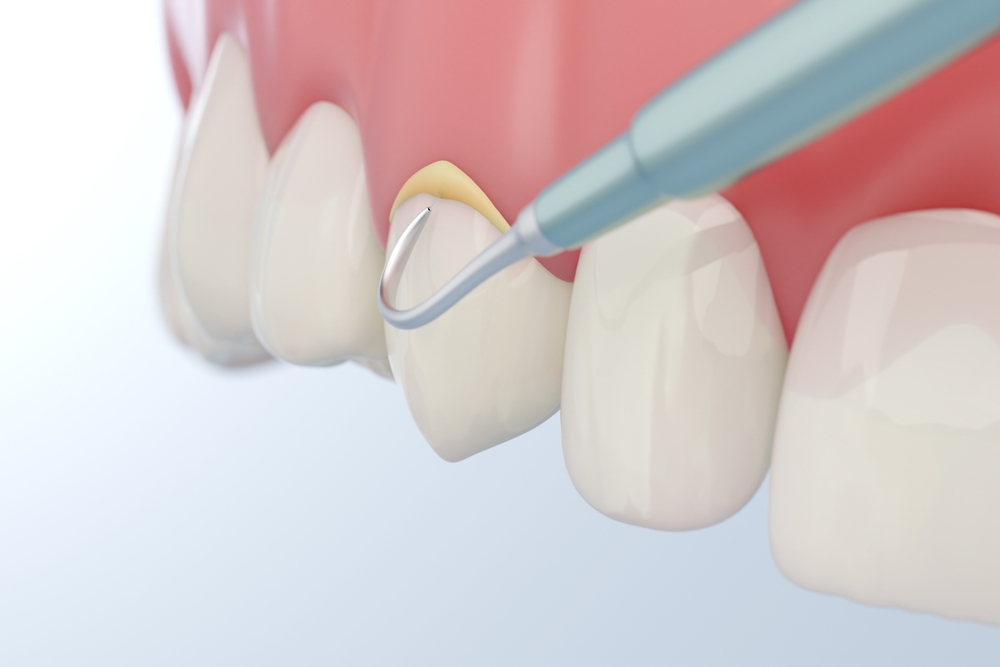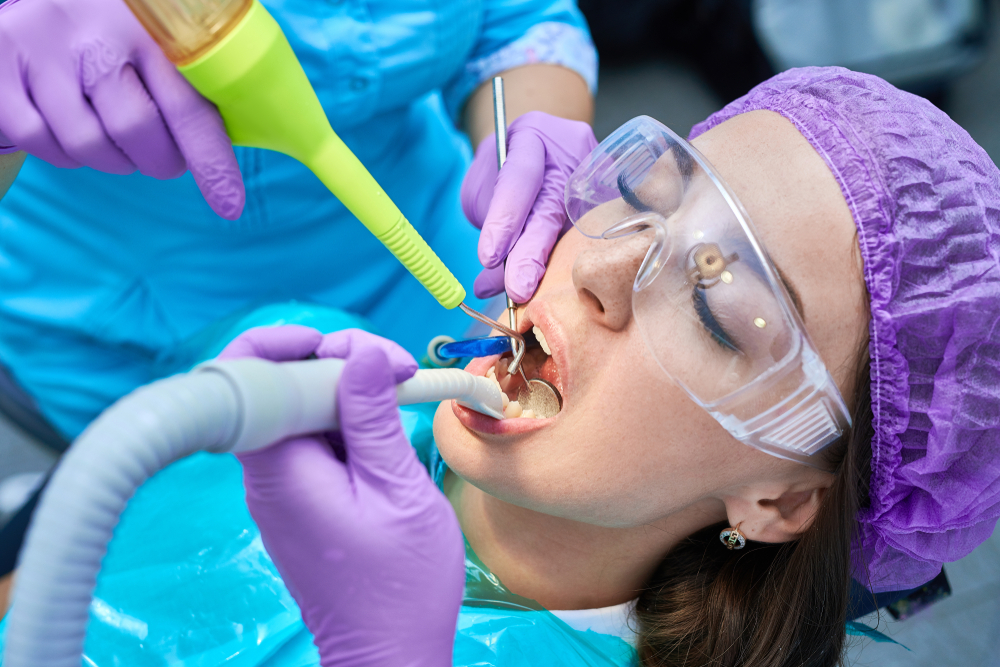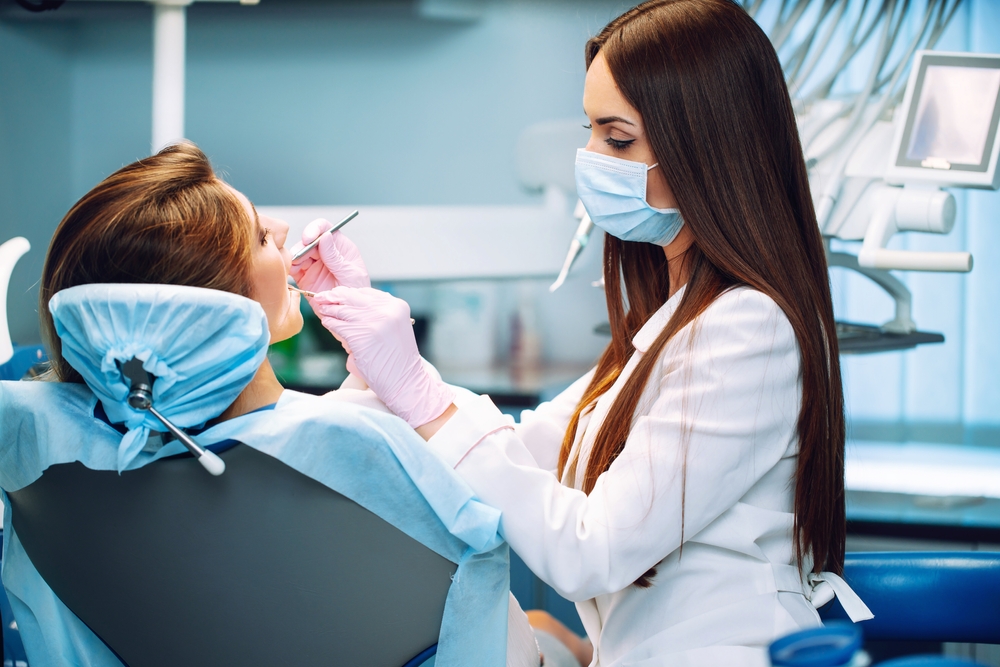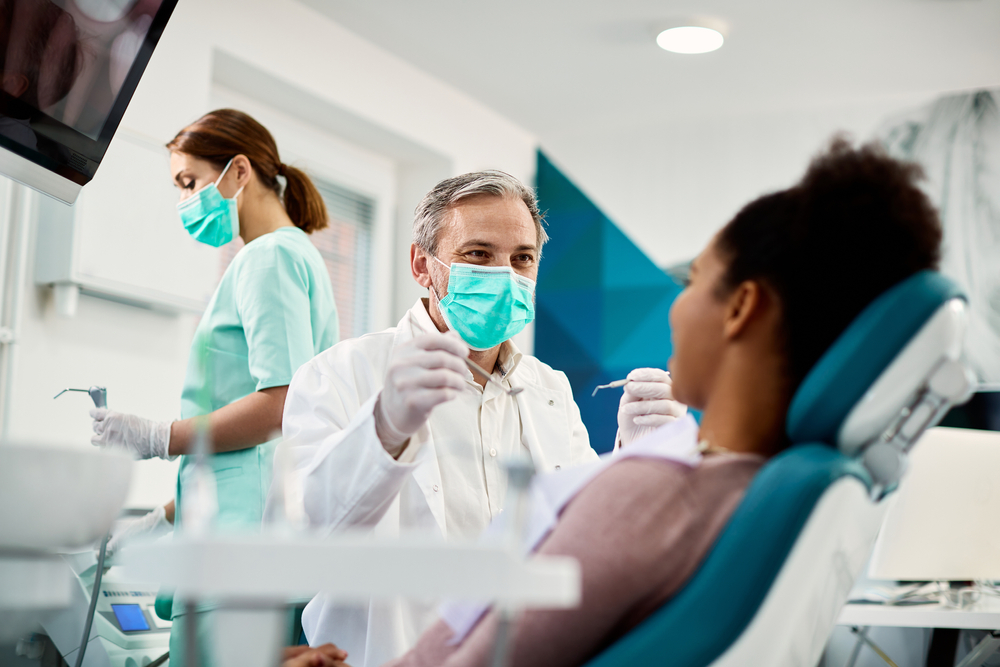Scaling and air polishing are both common and important dental procedures to maintain good oral hygiene. Let’s look at the difference between them and when both procedures are necessary.
What is Scaling?

Scaling is a routine dental procedure that removes plaque, tartar, and bacterial toxins from the teeth, especially from areas that are hard to reach with regular brushing and flossing. This process is an essential part of professional dental cleanings and can be performed by a dentist or dental hygienist.
Plaque is a sticky film of bacteria that constantly forms on our teeth that can harden into tartar when not removed through proper brushing, and can only be eliminated by a dental professional. Scaling involves using special dental tools to carefully scrape away these deposits from both above and below the gum line to help prevent gum disease.
Gum disease can cause inflammation and bleeding of the gums as well as infections that lead to abscesses and eventually tooth loss.
Dentists use different techniques for scaling:
- Manual scaling
- Ultrasonic scaling
- Advanced scaling and root planing
Manual scaling uses handheld instruments to physically remove deposits from the teeth, while ultrasonic scaling employs a device that vibrates at high frequencies to break up and remove plaque and tartar, while also spraying a cooling mist of water to flush away debris.
For those with advanced gum disease, a more intensive form of scaling and root planing may be necessary. This procedure involves cleaning the roots of the teeth to remove bacterial toxins and smoothing the root surfaces to help the gums heal and prevent plaque from building up so easily. Often, scaling and root planing are performed together as part of a “deep cleaning”.
Scaling is usually part of a routine dental check-up every six months, however, occasionally more frequent scaling may be required.
What is Air Polishing?

Air polishing is a dental cleaning technique that uses a stream of compressed air, water, and fine powder to remove plaque, surface stains, and soft deposits from the teeth. Unlike traditional polishing methods, which use a rubber cup and abrasive paste, air polishing relies on a high-pressure mixture to clean the teeth without direct contact.
The process works by spraying a controlled jet of air, water, and an abrasive powder onto the tooth surface. This combination is highly effective at removing biofilm (a layer of bacteria), food and drink stains, and other soft deposits. Because it does not involve friction or direct pressure on the teeth, air polishing is often considered gentler than traditional methods, and less effective at removing more severe deposits like tartar.
Air polishing has several benefits over traditional polishing:
- It’s faster
- It’s less abrasive
- It reaches difficult areas more easily
- It’s more comfortable, especially for those with sensitive teeth
However, it’s not always suitable for everyone.
Types of Air Polishing
Different types of powders are used in air polishing, each suited to specific needs:
- Sodium bicarbonate is a common choice for removing surface stains, especially those caused by coffee, tea, wine, and tobacco.
- Glycine is a much finer, less abrasive powder, making it ideal for patients with sensitive teeth, gum disease, or dental implants.
- Erythritol is another very fine powder, similar to glycine, but with added benefits for managing biofilm and plaque, particularly around implants and during periodontal therapy.
Air polishing can be used in a variety of dental procedures. It is effective for routine dental cleanings, periodontal maintenance (especially for patients with gum disease), orthodontic care (such as cleaning around braces and other orthodontic appliances), and implant maintenance (where it safely cleans around dental implants and prosthetic restorations without causing damage).
However, air polishing may not be suitable for everyone. Patients with respiratory issues, kidney problems, or those on a restricted sodium diet might not be good candidates for sodium bicarbonate-based powders. Additionally, dentists may avoid air polishing in areas with deep periodontal pockets or around certain types of dental restorations.
What is the Difference Between Scaling and Air Polishing?

While scaling and air polishing are both dental procedures used to clean teeth, they serve different purposes and use different methods.
Scaling focuses on removing hardened deposits of plaque and tartar from the teeth. This is essential because tartar, which is hardened plaque, cannot be removed by regular brushing or flossing. Dentists or dental hygienists use specialised tools for scaling to effectively clean the teeth in order to prevent or treat gum disease, reduce gum inflammation, and maintain overall oral health.
Air polishing, on the other hand, is a method used primarily for removing soft deposits, such as plaque, and superficial stains from the teeth. Using a high-pressure jet of air, water, and fine powder, air polishing cleans the tooth surfaces to eliminate stains and soft deposits. It is also gentler and more comfortable, making it ideal for patients with sensitive teeth, exposed roots, or orthodontic appliances, although less effective on tartar and more severe oral health issues.
In summary, scaling is designed to remove hard deposits from teeth, especially under the gums, to prevent gum disease, while air polishing is used to clean and polish teeth, remove soft deposits, and lighten stains. They often complement each other during a comprehensive dental cleaning to achieve optimal oral hygiene but aren’t interchangeable.
What to Do When Scaling or Air Polishing May Not Be Effective
Scaling and air polishing are highly effective dental procedures for cleaning teeth and managing gum health, but there are situations where these treatments may not be sufficient or appropriate due to the extent of dental damage or disease.
Extensive Tartar or Deep Pockets
When tartar has built up excessively below the gum line, or if there are very deep pockets between the teeth and gums, scaling alone may not effectively clean these areas. If the pockets are too deep, bacteria and tartar might persist, leading to continued gum inflammation and infection. This may necessitate periodontal surgery to access and clean these deeper areas more thoroughly.
Advanced Gum Disease (Periodontitis)
In cases of severe periodontal disease, scaling and root planing (a more intensive form of deep cleaning) may not be enough. When the disease has progressed to the point where there is significant bone loss, deep periodontal pockets, or loose teeth, non-surgical treatments like scaling might not fully resolve the condition. In such cases, surgical interventions may be required, such as flap surgery (to remove tartar from deep pockets) or bone grafting (to restore lost bone).
Severe Staining or Decay
Air polishing may not be effective for removing certain types of stains, such as intrinsic stains (those that are within the tooth structure) or heavy stains caused by years of smoking or excessive consumption of coffee or tea. Additionally, air polishing cannot address tooth decay or cavities; it only removes surface stains and biofilm. For these conditions, other treatments like teeth whitening, fillings, crowns, or veneers may be necessary for aesthetic and oral health improvements.
Compromised Teeth or Restorations
Teeth that are structurally compromised, such as those with significant decay, fractures, or extensive wear, may not benefit from scaling or air polishing. Similarly, certain dental restorations (like crowns, bridges, or veneers) might be sensitive to scaling. In such cases, the dentist will need to address the underlying issues first, which could involve restorative procedures like fillings, crowns, root canal therapy, or tooth extraction if the damage is severe.
How to Treat Serious Dental Issues

The first step to treating serious dental issues is making an appointment with your dentist.
Here are some of the options they may discuss to treat your dental health:
- Periodontal surgery may be necessary to clean infected areas, reduce pocket depth, and regenerate lost bone or gum tissue.
- Restorative dental procedures such as fillings, crowns, bridges, or veneers may be required to restore function and appearance.
- Tooth extraction may be necessary when teeth are too damaged to be saved.
So, while scaling and air polishing are effective for maintaining oral hygiene and managing early to moderate gum disease, they may not work in cases of severe dental damage, advanced gum disease, or deep stains, where more intensive treatments or restorative procedures may be necessary.
Rodericks Dental
If you need dental care in the Yeovil area, look no further than Resolution Smile! Contact us today to learn more about the services our expert team offers or talk to us about financing options.

